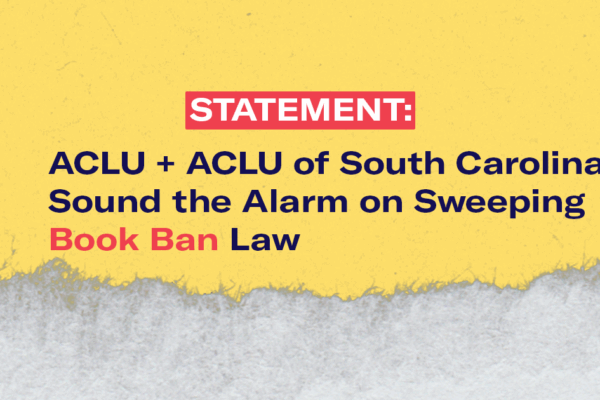COLUMBIA, S.C. — A South Carolina regulation that would enable mass censorship of books in school classrooms and libraries is set for automatic approval tomorrow, June 25th.
Titled “Uniform Procedure for Selection or Reconsideration of Instructional Materials,” this regulation was crafted by Ellen Weaver’s South Carolina Department of Education and sets a statewide policy banning books that contain descriptions of “sexual conduct” and “excretory functions.” This broad definition could be used to remove a vast range of literature from South Carolina schools, including classics like The Canterbury Tales, 20th-century masterpieces like 1984, and even children’s books like Everyone Poops.
“Superintendent Weaver is seeking to hand unprecedented power to pro-censorship groups, overriding students’ freedom to read as well as parents’ right to direct their own children’s education,” said Josh Malkin, advocacy director at ACLU of South Carolina. “At a time when we can’t afford to lose more educators, the superintendent’s book banning policy would place mountains of paperwork and a threat of punishment on the backs of public school teachers and librarians. We're calling on the superintendent to walk back this dangerous and draconian regulation."
This broad-reaching policy is set to take effect automatically, despite the fact that it was not debated or voted upon by either the state Senate or House as process typically dictates. School districts can decide if this policy applies retroactively, however it is automatic going forward. Librarians have been left without guidance as to how to go forward with future purchases, and there’s worry that the districts that decide to defend books will be flooded with challenges. A similar policy in Iowa, for example, has already led to the removal of books including Native Son, Ulysses, and The Color Purple from schools.
Over the past year, pro-censorship organizations have tried banning books in bulk via local school boards in at least a dozen counties, but they have largely been thwarted when districts listened to parents, teachers, and librarians who actually read the books. As the ACLU of South Carolina has repeatedly explained, the regulation would undermine parental rights and harm public education by throwing open the floodgates for mass book bans and encouraging self-appointed censors to impose their beliefs on all South Carolinians via appeals to the State Board of Education.
South Carolina’s regulation is part of a troubling nationwide book ban trend. The American Library Association recently documented that in 2023, 4,240 unique book titles were targeted for censorship, and there were over 1,247 demands to censor library books, materials, and resources.
The ACLU and ACLU of South Carolina will continue to fight for a public education system where all students can see themselves, their experiences, and their histories reflected on library shelves.
Stay Informed
Sign up to be the first to hear about how to take action.
By completing this form, I agree to receive occasional emails per the terms of the ACLU’s privacy statement.
By completing this form, I agree to receive occasional emails per the terms of the ACLU’s privacy statement.

